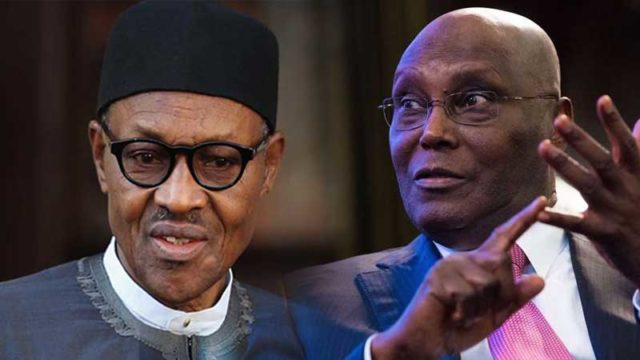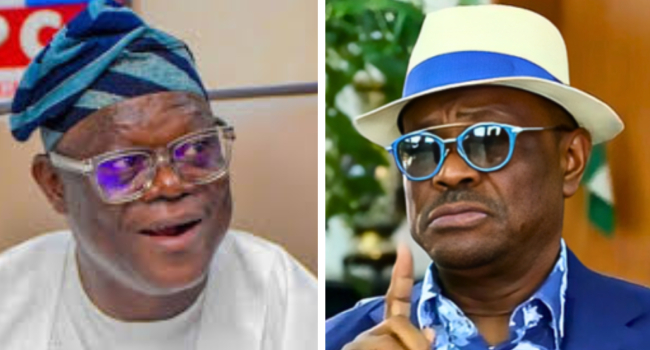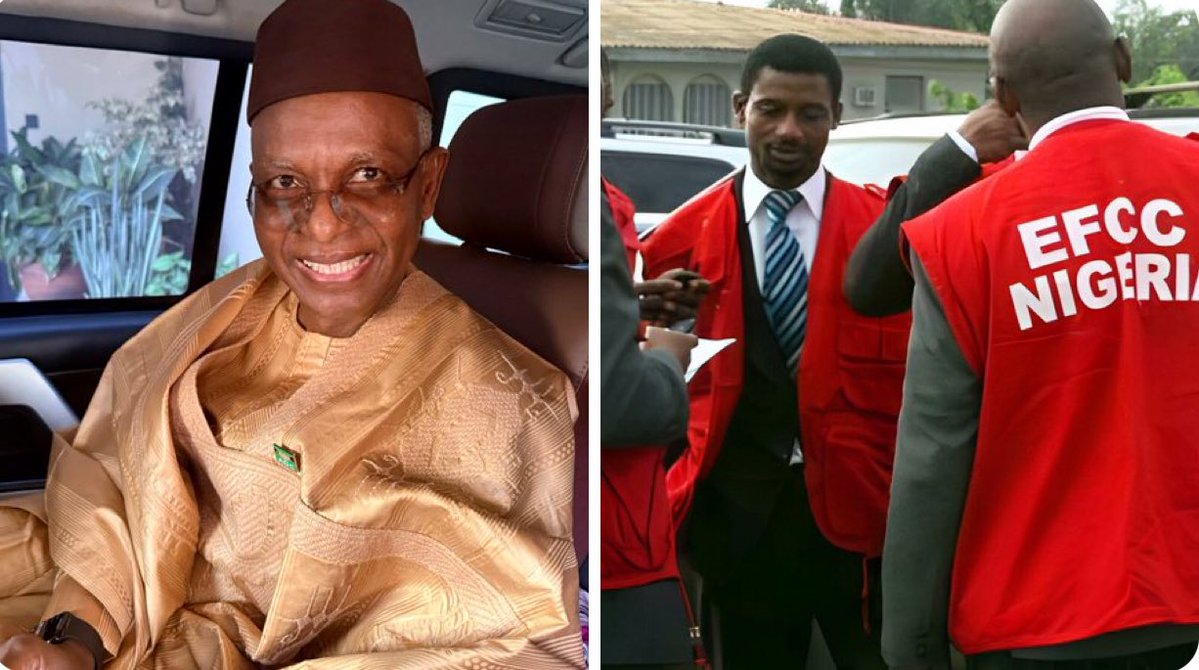By Dele Momodu
Fellow Nigerians, let me say congratulations to both President Muhammadu Buhari and his main challenger, Alhaji Atiku Abubakar, for different reasons, even as Atiku claims that it was as if he has been robbed in broad daylight. For me, what we witnessed last week was one of the worst elections ever in Nigeria, in many ways. It is a big shame that the opposition was totally annihilated and obliterated in multiple attacks. What should have been a simple and straight-forward election was turned into full-scale war. It is saddening that a leader who was the greatest beneficiary of a much freer and fairer election in 2015 would not provide a level playing field for others to play, despite his much vaunted public avowal to ensure credible elections by not interfering with the electoral umpire and the security agencies.
APC and Buhari decidedly and deliberately set out to frustrate the main opponent, Atiku, using the appurtenances of power in a reckless and inconsiderate manner. It is my hope that this has not set a dangerous precedent for others to follow. The over-militarisation of a democratic process was unconstitutional and unnecessary. Maybe our insurgency and militant problems would have been long curtailed if the same might and firepower had been deployed in these problem areas. Disenfranchising voters in different parts of Nigeria in various ways from failed and ineffective card readers to intimidation and the ⁶irresponsible Inflating of voter turn-out in some areas and reducing them in other areas was undemocratic. Voiding ballots like pop-corn was farcical. The infractions were just too brazen, to say the least, although Atiku, and the PDP itself, cannot be absolved of being involved and culpable in some of these infractions.
Despite all these hocus-pocus, I’m a very practical human being. Over time, I have learnt so much about the meaning and significance of sacrifice. Disappointment and pain go together. As mere mortals, we find it hard, and sometimes impossible, to forgive those who have wronged us, remorselessly. The recent election was nothing to rejoice about, in good conscience, after the worst evil of death was visited on fellow Nigerian citizens. I sympathise with the families of these unfortunate deceased patriots and offer them my condolences. May their souls rest in peace. But no matter our agony over spilt milk, we must all clear the mess while awaiting God’s judgment. There is a saying in our culture that whosoever you can’t defeat by your own power should be handed over to God. That is my attitude to this unfortunate saga.
Nigeria has gone through great difficulty and hardship in recent times. Expectations have turned into mirage and ashes. Hope has vaporised. But there are those with mighty faith who still believe Buhari will move mountains in his second term. To them and the government, I say good luck. Nothing is impossible. For me, the government has been given a reprieve, like a condemned man on death row. The hope and expectation are that the Yoruba saying “eni a wi fun, olorun oba je ko gbo” (the person we talk to, we can only hope will listen) will be imbibed. After every election, we must take stock, learn new lessons, and settle down to keep working. I’m happy that many serious-minded Nigerians have corroborated and supported my sincere advice on the way forward. I have come a long way in political struggles in Nigeria not to know our dear country well enough.
I witnessed one of the worst Nigerian general elections in 1983. The ruling NPN party had claimed landslide and “moonslide” victories everywhere, including the most unlikely of places. My boss, Chief Akin Omoboriowo, was one of the beneficiaries having been declared the winner of the Ondo State Governorship election. A perfect gentleman, Chief Omoboriowo was extremely reluctant to follow the NPN to Golgotha, but was persuaded by desperate party members who told him “that’s how they do it…” By the time things fell apart, and the blood started flowing like a river while human beings were roasted like grilled suya, my boss had to retreat and give up the mandate that was stolen for him by his party, NPN. We all knew there was no way Omoboriowo would have defeated his erstwhile boss, Chief Adekunle Ajasin, in Ondo State at the time. Omoboriowo had been the Deputy Governor to Ajasin. I was barely 23, when I served as his Private Secretary. That was my baptism of fire.
About 36 years after that conflagration erupted in Nigeria, we witnessed a similar event last week. It seemed the militarisation was copied from that ungodly era. The heavily militarised Nigeria Police Force was in the centre of operations at that time and not soldiers like Buhari drafted out last week although the Police headed by the Inspector General of Police, Sunday Adewusi, was equipped with armour-tanks and military hardware to take on innocent Nigerians. What happened thereafter? Three months later, the Mallam Shehu Shagari government collapsed like a pack of cards and the cookie crumbled. Who took over power in the military putsch? The one and only Muhammadu Buhari. One of the reasons adduced for the military coup was the recklessness of the ruling party NPN, which acted similarly to what APC has now repeated, before our very eyes.
Buhari and his deputy, Major-General Babatunde Idiagbon, announced their intention to instil discipline in Nigerians and banish corruption totally. Poor Nigerians rejoiced, believing their Messiah had come to liberate them from the brigands and looters. Politicians were hurled into detention, faced military trials and received horrendous and unprecedented sentences. But recession soon set in. Essential commodities had to be rationed. Anyway, the government itself fell in 1985 and the same people who hailed the coming of Buhari were seen rejoicing.
Please, fast forward to 1993. Chief Moshood Kashimawo Olawale Abiola won the June 12, 1993, election, fair and square, by defeating his opponent, Alhaji Bashir Tofa. I left Nigeria on June 9, 1993, and was in Vienna, Austria, by June 10, 1993, to represent Chief Abiola, at the Bruno Kreisky Awards, where the gadfly, Chief Gani Fawehinmi, was a distinguished recipient. The award ceremony took place on June 11, and I departed Vienna on June 12 to London. I was in London on June 14, when I made a call to Nduka Obaigbena, an uncommon Publisher who had shown extraordinary knack for sniffing major news from a tender age. Nduka told me he’d been trying to locate me. I told him I was in London. His next statement shocked me to my bones and out of my wits: “Dele, it seems your man Abiola is going to win the election, but the military won’t hand over to him. You need to reach him urgently to talk to his friend IBB…” I thought “Nduka must be joking”. “How can someone win a Presidential election and he won’t be allowed to govern?” I soliloquised. I later discovered that Nduka passed the same message to Dr (Mrs) Doyinsola Abiola.
One thing led to another, but the effort to get Chief Abiola and President Babangida talking did not materialise. There were too many expert advisers, with all manner of suggestions. Babangida soon came up with an Interim Government, headed by Chief Ernest ‘Degunle Shonekan who lasted only three months before the Abacha coup sacked him. Abacha came on the pretence that he was going to redress the injustice by spending a short period, sack the Babangida boys in the military, and hand over to Abiola. That too was a charade, indeed, phantasmagoria!
On a personal note, I got caught up in the imbroglio. First, I was detained at Alagbon Detention centre. Whilst incarcerated, some people were busy abusing me, “what’s your own, are you Abiola’s biological son?” There were those who said my arrest was fake, that I was working for government. Such is the pain of fighting for social justice in our country. People regretfully sit in the comfort of their homes casting aspersions at those willing to make the necessary asacrifice.
Chief Abiola was arrested and detained in 1994. Prince Ademola Adeniji-Adele (of blessed memory) and I were vehemently opposed to Abiola being captured by Abacha. We felt that Abiola should disappear once more and fight from abroad. But some elders opined that he needed to be in Nigeria to defend his mandate. I will never forget the night Abiola was arrested. We had gone to Chief Wahab Dosunmu’s house in Surulere to bring Chief Abiola back home. We arranged a human shield at Abiola’s home so that it would be difficult to arrest him. Abiola’s family did all they could by arranging food and drinks for his huge crowd of supporters. As Abiola’s motorcade drove into his home in Moshood Abiola Crescent, we noticed about 600 police officers perching along Toyin Street. Everywhere was bustling.
Once he entered his bedroom, Chief Abiola said I should go home to freshen up because I had been part of some crazyqq11 operations for the past 48 hours with his Personal Assistant, Fred Enoh. Ironically, the crowd dispersed after eating free food. I returned later in the night to discover that the police had cordoned off the building. I went to a business centre, telephones were not common then, to call Chief Abiola. He told me not to worry and that I should go home. “I’ve been told they are coming to arrest me at 1.00am but I don’t think Sani (Abacha) can try it o…” Those were Abiola’s last words to me on earth. As soon as Abiola got arrested, he was taken to some terrible prison in the Northern part. He was able to smuggle a letter out in which he instructed Dr Abiola to ask me to visit him. I was on my way to Gashua, via Maiduguri and Damaturu, when we heard he’d been moved from the prison to another location. The crowd around his house began to thin out. Abiola spent about four years in solitary confinement and never came back alive.
Whilst doing my utmost to support Abiola during his incarceration, one day, I myself had to flee as, on July 22, 1995, my wife told me that I had to run for my dear life. I have told the story of my escape to London via Benin Republic, Togo and Ghana several times. I spent three years in harsh and difficult years in exile but did not relent in the struggle to see democracy return to Nigeria. Despite my significant suffering, some people were busy saying I ran away, bla, bla, bla. The lesson I learnt was that Nigerians are generally not ready to make any sacrifice for democracy, and those who are willing would always be discouraged by negative comments and abuse. My thesis is that this is why we have not been able to sustain any struggle.
Most Nigerian politicians cannot survive in opposition. When tomorrow comes, Atiku Abubakar, will see many grumblers saying they can’t die because of him. At the beginning of the Abacha government, a meeting was held in Abiola’s house. Abiola and loyalists were shocked, when politician after politician, started giving reasons, and excuses, why Abiola should let them join the Abacha Government. Chief Abiola had given me names of those who have decided to join the new government, prior to the meeting and so he was not disappointed when they did confirm they were leaving him. Nigeria is a very complicated society where most lives depend on government patronage. Chief Abiola used to say, “you can’t blame a hungry man for looking for food”.
I have witnessed enough of Nigeria’s trajectory and the future is still very bleak for opposition because elections in our country are usually a matter of winner-takes-all. The Jonathan concession now seems an aberration. It was partly for this reason that I enjoined Atiku to accept his lot and congratulate President Buhari. It is my view that Atiku would have demanded the same had he won. What would he have done if Buhari refused and tried to cling on to power? A sitting President has the power and might to do as he pleases. Atiku must demonstrate that he is the Statesman that some of us believe he is by being gracious. The other reason is the fact that no successful litigation has ever been achieved by any defeated Presidential candidate in Nigeria. The rigours and demands of an election petition make it practically impossible for such success.
The panacea for peace is for members of the Peace Council and other well-meaning Nigerians to do everything possible to bring Buhari and Atiku together, face to face. I accept that Atiku is not in the same position as Abiola because he has no mandate and therefore should not be making demands of the government. However, the example of Kenya should be adopted. While it is not possible within our Constitution to attempt the Kibaki/Odinga hybrid, as President and Prime Minister, it should be possible for Buhari to show uncommon magnanimity by tolerating and accommodating Atiku in some mutually acceptable manner. Buhari and Atiku can jointly appear in an interdenominational day of prayers and seek to unite our divided country.They should say the right things to affirm that the country is greater than both of them. No Nigerian henceforth should be oppressed or victimised on account of political affiliation, religion, ethnicity or gender. Nigerians should be treated as citizens of one indivisible country created by God.
No price is too heavy for peace.

 News5 days ago
News5 days ago
 Headline5 days ago
Headline5 days ago
 Featured4 days ago
Featured4 days ago
 Featured4 days ago
Featured4 days ago
 Headline6 days ago
Headline6 days ago
 National5 days ago
National5 days ago
 Featured3 days ago
Featured3 days ago
 Featured3 days ago
Featured3 days ago












